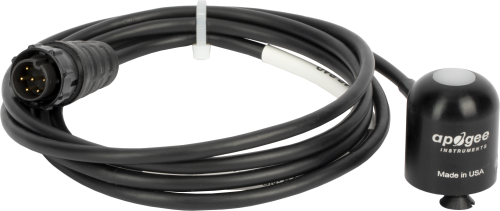
Ideal for long-term deployment in harsh conditions






Overview
The CS305-ET pyranometer, manufactured by Apogee, uses a different fixed multiplier than the CS300.
Read MoreBenefits and Features
- Dome-shaped head prevents water from accumulating on the sensor head
Images

Technical Description
The CS305-ET measures total sun and sky solar radiation using a silicon photocell. The spectral range is 300 to 1000 nanometers, which encompasses most of the shortwave radiation that reaches the Earth's surface.
The standard output is 0.005 mV per W m-2, which provides a signal of 5 mV in full sunlight (1000 W m-2). All of our data loggers, except the CR200(X) series, can measure this output. Therefore both the ET107 and ET106 are compatible.
Compatibility
The connector attaches to an ET107 or ET106 Weather Station.
Specifications
| Light Spectrum Waveband | 300 to 1100 nm |
| Measurement Range | 0 to 2000 W m-2 (full sunlight ≈ 1000 W m-2) |
| Absolute Accuracy | ±5% for daily total radiation |
| Sensitivity | 0.2 kW m-2 mV-1 |
| Cosine Response |
|
| Temperature Response | < 1% (at 5° to 40°C) |
| Long-Term Stability | < 2% per year |
| Diameter | 2.4 cm (0.9 in.) |
| Cable Length | 152.4 cm (60 in.) |
| Height | 2.5 cm (1.0 in.) |
| Weight | 65 g (2.3 oz) |
Related Documents
Product Brochures
Related FAQs
Number of FAQs related to CS305-ET: 2
-
Most Campbell Scientific sensors are available as an –L, which indicates a user-specified cable length. If a sensor is listed as an –LX model (where “X” is some other character), that sensor’s cable has a user-specified length, but it terminates with a specific connector for a unique system:
- An –LC model has a user-specified cable length for connection to an ET107, CS110, or retired Metdata1.
- An –LQ model has a user-specified cable length for connection to a RAWS-P weather station.
If a sensor does not have an –L or other –LX designation after the main model number, the sensor has a set cable length. The cable length is listed at the end of the Description field on the product’s Ordering tab. For example, the 034B-ET model has a description of “Met One Wind Set for ET Station, 67 inch Cable.” Products with a set cable length terminate, as a default, with pigtails.
If a cable terminates with a special connector for a unique system, the end of the model number designates which system. For example, the 034B-ET model designates the sensor as a 034B for an ET107 system.
- –ET models terminate with the connector for an ET107 weather station.
- –ETM models terminate with the connector for an ET107 weather station, but they also include a special system mounting, which is often convenient when purchasing a replacement part.
- –QD models terminate with the connector for a RAWS-F Quick Deployment Station.
- –PW models terminate with the connector for a PWENC or pre-wired system.
-
Many Campbell Scientific sensors are available with different cable termination options. These options include the following:
- The –PT (–PT w/Tinned Wires) option is the default option and does not display on the product line as the other options do. The cable terminates in pigtails that connect directly to a datalogger.
- In the –C (–C w/ET/CS110 Connector) option, the cable terminates in a connector that attaches to a CS110 Electric Field Meter or an ET-series weather station.
- In the –CWS (–CWS w/CWS900 Connector) option, the cable terminates in a connector that attaches to a CWS900-series interface. Connection to a CWS900-series interface allows the sensor to be used in a wireless sensor network.
- In the –PW (–PW w/Pre-Wire Connector) option, the cable terminates in a connector that attaches to a prewired enclosure.
- In the –RQ (–RQ w/RAWS Connector) option, the cable terminates in a connector that attaches to a RAWS-P Permanent Remote Automated Weather Station.
Note: The availability of cable termination options varies by sensor. For example, sensors may have none, two, or several options to choose from. If a desired option is not listed for a specific sensor, contact an application engineer at Campbell Scientific for assistance.
